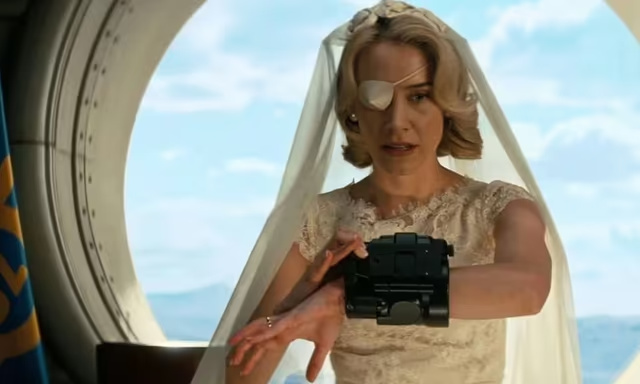If you click on a link and make a purchase we may receive a small commission. Read our editorial policy.
Doctor Who: "The Star Beast" really is based on a 1970s comic book drawn by Watchmen's Dave Gibbons
The 1979 comic strip "Doctor Who and the Star Beast" is the "uber text" for Russell T. Davies' Who, says the writer

In the summer of 2023, to the delight of fans who’ve been eagerly anticipating any information about the new era of Doctor Who, the BBC released a trailer for the three special episodes heralding the return of writer/producer Russell T. Davies and stars David Tennant and Catherine Tate. This trailer didn’t just feature teasing clips of the episodes themselves, but also debuted the titles of each episode.
Those episode titles were, in reverse order: The Giggle, Wild Blue Yonder, and The Star Beast.
Accompanying the title reveals, Davies — newly reinstalled as the showrunner of the Doctor Who — released a statement saying, “The titles are just the beginning of the Doctor’s biggest adventure yet. Autumn is coming, with three hours of danger, Donna and disaster about to be unleashed!”
What he didn’t say is that one of those titles had a particular significance for Doctor Who fans and comic book fans alike.
Back in 1979, the UK division of Marvel Comics launched Doctor Who Weekly, a new title aimed squarely at fans of the British science fiction institution. It wasn’t the first time the character had appeared in comics — he’d been a mainstay in anthologies from other publishers for more than a decade by this point — but this was his own title, and it launched with a creative team that had a lot of clout: the lead Doctor Who strip would be co-written by Judge Dredd co-creator John Wagner and 2000 AD co-creator Pat Mills, with art by Dave Gibbons, just a handful of years ahead of his career-defining Watchmen work.
Mills and Wagner alternated storylines, with each reportedly working off pitches they’d tried to sell to the BBC as scripts for the television show itself. Wagner’s stories were “City of the Damned,” and “The Dogs of War,” the latter of which mixed Daleks and werewolves (because Wagner’s always been good at high concepts). Mills, meanwhile, offered up “The Iron Legion” and… well, let’s look at the splash page for his second offering, shall we…?

As someone who loves this particular era of Doctor Who comics — I’m a massive fan of the Mills and Wagner stories for 2000 AD of this period, and Gibbons’ art has always been top-notch — the name of the first of Davies’ three comeback specials caught my attention immediately. “I wonder if it’s a coincidence or if it’s meant to be a reference to the old comic?” I thought to myself, and then I saw this image in the trailer:

The reason this caught my attention in particular was… well… this is from Mills and Gibbons’ comic book “Star Beast”:

Yes, the first episode of the new era of Doctor Who — the 60th anniversary special for the entire franchise — really is an adaptation of a black and white comic book story from 1979. Which is genuinely mindboggling… all the more so when I tell you that the “Star Beast” comic is, honestly, a very silly story in which an alien that looks like a cute giant space cat-thing; the whole thing is very camp, very fun, and entirely unserious romp… and hardly the kind of thing that TV audiences were going to be expecting if it’s adapted faithfully for the screen.
It’s worth pointing out that the story would have fitted easily into the previous era of Russell T. Davies showrunning Doctor Who — an era that included sentient (and adorable!) aliens made out of human fat, let’s never forget — and that Davies’ last time in charge of the franchise saw two of the era’s most popular episodes, “Blink” and “Human Nature,” adapted from a prose story from a Doctor Who annual and a 1990s spin-off novel, respectively. It only makes sense that the television “Star Beast” would, in fact, be a version of the 1979 comic book story.
That’s certainly a feeling that Davies himself shares; talking to Doctor Who Magazine earlier this year, the writer said of the original comic strip, “Coming back to it, it was amazing to realize how much those Mills and Wagner scripts have informed my entire attitude towards Doctor Who. It was like finding the uber text. I genuinely went, ‘Oh my God, I’m not just adapting The Star Beast; I’ve been adapting it since 2005!’ It’ how I think Doctor Who should be written.”
Davies isn’t the only member of the current Doctor Who TV team to be a fan of that era, with Tennant also saying that particular era of Doctor Who comic strips “was a very evocative time in terms of nostalgic memories for me. The Iron Legion. City of the Damned. The Star Beast in particular. The comic strips were better than the telly at that time.”
For their part, Mills and Gibbons admitted that they were “completely surprised” to learn that their story was being adapted — but they’re thrilled with how it worked out, with Mills telling Doctor Who Magazine that director Rachel Talalay has “taken the writers’ vision and made it work,” and Gibbons adding, “They’ve been so faithful to the comic. It’s very true to the spirit of it.”
For those who want to read the original Star Beast — and the other Mills/Wagner/Gibbons “uber text” for themselves, a new collected edition of strips from that era is available, complete with the Meep right there on the cover…
Doctor Who’s special episodes will run weekly on Saturdays through December 9. In the UK, it will be available as always on the BBC; internationally, it'll be part of Disney+.
Wondering how to get into Doctor Who? We have a guide to help you with that.
Follow Popverse for upcoming event coverage and news
Find out how we conduct our review by reading our review policy
Let Popverse be your tour guide through the wilderness of pop culture
Sign in and let us help you find your new favorite thing.
















Comments
Want to join the discussion? Please activate your account first.
Visit Reedpop ID if you need to resend the confirmation email.